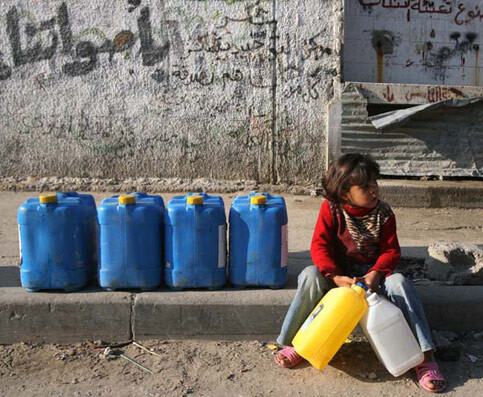The Electronic Intifada 13 January 2009

A Palestinian girl in Gaza takes a rest on her way to collect drinking water. (Iyad El Baba/UNICEF)
JERUSALEM (IRIN) - The Palestinian Water Authority (PWA) is concerned that waste water lagoons in the northern Gaza Strip could collapse due to the current fighting between Israel and Hamas.
“With Israel’s latest bombardment, there is a real risk that earth retention walls of a number of wastewater lagoons will break, releasing an estimated three million cubic meters of wastewater into the surrounding communities,” said Shaddad Attili, head of the PWA, in a statement on 12 January.
Attili said a lagoon collapsed in 2007 killing five people and displacing hundreds of families.
Majeda Alawneh, a spokeswoman for the PWA, told IRIN three of her staff in Gaza had been killed in the Israeli offensive which began on 27 December. “Two staff members were working in the waste water sector and one was on duty at a water well,” she said from the PWA’s Ramallah office.
One shell had hit a lagoon with a weak retaining wall, supported by sand, and the PWA was concerned the damage might cause a collapse, she said.
The Coastal Municipalities Water Utilities (CMWU), Gaza’s main water agency, said it had received unconfirmed reports that 200,000 cubic meters of wastewater had leaked from the Gaza City treatment plant after an embankment sustained damage during the fighting.
“The Israeli bombardment of the Gaza Strip is causing extensive damage to homes and to public infrastructure and is jeopardizing water, sanitation and medical services,” said the UN humanitarian coordinator’s statement on 12 January.
Health
“There are increasing risks of epidemic outbreaks resulting from the disruption of vaccinations, uncollected rubbish piling up in the streets and unsafe drinking water,” the statement added.
At least 500,000 (a third of the population) have been cut off from water and sanitation services due to fighting in the enclave, the PWA said.
The UN Children’s Fund (UNICEF) said it had brought in water purification kits for 30,000 people.
Safety
Alawneh said her teams were unable to move freely in Gaza and were concerned about their safety. This affected the PWA’s ability to assess and repair damage. “First, we are worried about their safety and also we have a shortage of spare parts,” she said.
Alawneh said her teams were concerned for their safety even during the daily three-hour Israeli ceasefires, as in many cases fighting raged on during the allotted time, and in any event it was not enough time to asses and fix damage, even if they had the spare parts.
The PWA has asked Israel to let in equipment, and some will be allowed in, but the Israeli authorities have rejected requests for steel and cast iron pipes which it says could be turned into homemade rockets by militants.
Gaza’s water and sewage problems are not new but exacerbated by the current offensive.
This item comes to you via IRIN, a UN humanitarian news and information service, but may not necessarily reflect the views of the United Nations or its agencies. All IRIN material may be reposted or reprinted free-of-charge; refer to the copyright page for conditions of use. IRIN is a project of the UN Office for the Coordination of Humanitarian Affairs.
Related Links

